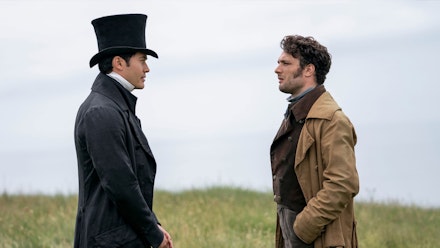One of many fabrications of Netflix’s take on Persuasion is a scene in which our heroine, Anne Elliot (Dakota Johnson), describes a dream. In it, Anne finds herself caught in the arms of an octopus before realising that the tentacles belong to her — that she is “sucking my own face”. One wonders if such a phrase would ever have passed the lips of Austen, who occupies pride of place in the pantheon of great English writers.
The description of Anne’s hentai fantasy, along with discussions of “exes” and “tens”, border on the sacrilegious. It is an insult to credit this film as an adaptation of Austen’s Persuasion, for beyond character and place names, the screenplay, by Ron Bass and Alice Victoria Winslow, bears only the shallowest resemblance to that work. What Netflix has created is a version of Austen for the Bridgerton viewer, a candified reality show dressed in Regency clothing.

At the heart of this bastardisation is Dakota Johnson, who renders Anne a modern, melancholic bitch à la Fleabag (note the constant eye-flicks to camera). Her Anne guzzles red wine from the bottle, somehow listens to Beethoven in her room, and uses modern Millennial vernacular in a manner that quickly grates.
It’s a shame such esteemed actors have to work with this Mills & Boon version of Austen’s work.
Her Wentworth hardly finds the embodiment of charisma in Cosmo Jarvis. He pales next to the effervescent charms of Henry Golding as Anne’s cousin and secondary suitor, whose presence is as refreshing as the sea breeze lapping the coast of Lyme Regis. He seems to be the only person on set who has actually read a word of Austen.
Director Carrie Cracknell, making her film debut after a long career in theatre, seems quite content to have her cast standing or sitting about. While there are some pleasant shots of British beaches, it is a shame that the final stages of Persuasion neglect to show off Bath’s architecture more. To not make proper use of Austen’s former home city seems lazy, another misunderstanding of the material.
Cracknell has said that she wanted a more diverse cast than previous adaptations, and it is good to see her bringing theatrical, colour-blind casting to a period drama. Yet unlike Armando Iannucci’s The Personal History Of David Copperfield, for example, which cast Dev Patel in the lead, the non-white cast are uncomfortably relegated to the fringes of the scenery.
Of the supporting cast, Richard E. Grant seems to have mistaken Austen for Oscar Wilde in his pantomime rendition of Anne’s father, while Nikki Amuka-Bird is given a much-reduced version of Lady Russell, who takes cougar tours of Europe. It’s a shame such esteemed actors have to work with this Mills & Boon version of Austen’s work.

